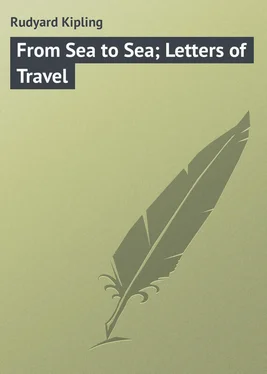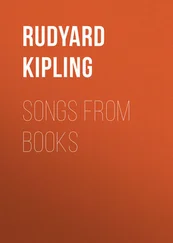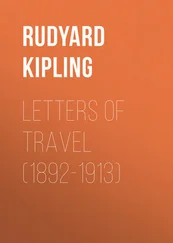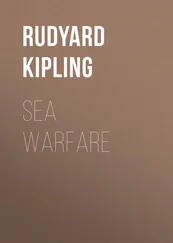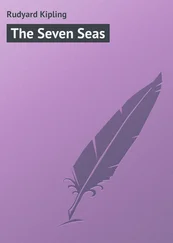Rudyard Kipling - From Sea to Sea; Letters of Travel
Здесь есть возможность читать онлайн «Rudyard Kipling - From Sea to Sea; Letters of Travel» — ознакомительный отрывок электронной книги совершенно бесплатно, а после прочтения отрывка купить полную версию. В некоторых случаях можно слушать аудио, скачать через торрент в формате fb2 и присутствует краткое содержание. Жанр: foreign_prose, foreign_language, на английском языке. Описание произведения, (предисловие) а так же отзывы посетителей доступны на портале библиотеки ЛибКат.
- Название:From Sea to Sea; Letters of Travel
- Автор:
- Жанр:
- Год:неизвестен
- ISBN:нет данных
- Рейтинг книги:5 / 5. Голосов: 1
-
Избранное:Добавить в избранное
- Отзывы:
-
Ваша оценка:
- 100
- 1
- 2
- 3
- 4
- 5
From Sea to Sea; Letters of Travel: краткое содержание, описание и аннотация
Предлагаем к чтению аннотацию, описание, краткое содержание или предисловие (зависит от того, что написал сам автор книги «From Sea to Sea; Letters of Travel»). Если вы не нашли необходимую информацию о книге — напишите в комментариях, мы постараемся отыскать её.
From Sea to Sea; Letters of Travel — читать онлайн ознакомительный отрывок
Ниже представлен текст книги, разбитый по страницам. Система сохранения места последней прочитанной страницы, позволяет с удобством читать онлайн бесплатно книгу «From Sea to Sea; Letters of Travel», без необходимости каждый раз заново искать на чём Вы остановились. Поставьте закладку, и сможете в любой момент перейти на страницу, на которой закончили чтение.
Интервал:
Закладка:
So, after one last look at the Palace high up the hillside, the Englishman was borne away along the Deoli Road. The peculiarity of Boondi is the peculiarity of the covered pitfall. One does not see it till one falls into it. A quarter of a mile from the gate, town and Palace were invisible. But the Englishman was grieved at heart. He had fallen in love with Boondi the beautiful, and believed that he would never again see anything half so fair. The utter untouchedness of the town was one-half the charm and its association the other. Read Tod, who is far too good to be chipped or sampled; read Tod luxuriously on the bund of the Burra Talao, and the spirit of the place will enter into you and you will be happy.
To enjoy life thoroughly, haste and bustle must be abandoned. Ram Baksh has said that Englishmen are always bothering to go forward, and for this reason, though beyond doubt they pay well and readily, are not wise men. He gave utterance to this philosophy after he had mistaken his road and pulled up in what must have been a disused quarry hard by a cane-field. There were patches and pockets of cultivation along the rocky road, where men grew cotton, chillies, tobacco, and sugar-cane. "I will get you sugar-cane," said Ram Baksh. "Then we will go forward, and perhaps some of these jungly-fools will tell us where the road is." A "jungly fool," a tender of goats, did in time appear, but there was no hurry; the sugar-cane was sweet and purple and the sun warm.
The Englishman lay out at high noon on the crest of a rolling upland crowned with rock, and heard, as a loafer had told him he would hear, the "set of the day," which is as easily discernible as the change of tone between the rising and the falling tide. At a certain hour the impetus of the morning dies out, and all things, living and inanimate, turn their thoughts to the prophecy of the coming night. The little wandering breezes drop for a time, and, when they blow afresh, bring the message. The "set of the day," as the loafer said, has changed, the machinery is beginning to run down, the unseen tides of the air are falling. This moment of change can only be felt in the open and in touch with the earth, and once discovered, seems to place the finder in deep accord and fellowship with all things on earth. Perhaps this is why the genuine loafer, though "frequently drunk," is "always polite to the stranger," and shows such a genial tolerance towards the weaknesses of mankind, black, white, or brown.
In the evening when the jackals were scuttling across the roads and the cranes had gone to roost, came Deoli the desolate, and an unpleasant meeting. Six days away from his kind had bred in a Cockney heart a great desire to see a fellow-subject. An elaborate loaf through the cantonment – fifteen minutes' walk from end to end – showed only one distant dog-cart and a small English child with an ayah. There was grass in the soldierly straight roads, and some of the cross-cuts had never been used at all since the days when the cantonment had been first laid out. In the western corner lay the cemetery – the only carefully tended and newly whitewashed thing in this God-forgotten place. Some years ago a man had said good-by to the Englishman; adding cheerily: "We shall meet again. The world's a very little place y' know."
His prophecy was a true one, for the two met indeed, but the prophet was lying in Deoli Cemetery near the well, which is decorated so ecclesiastically with funeral urns.
XIX
COMES BACK TO THE RAILWAY, AFTER REFLECTIONS ON THE MANAGEMENT OF THE EMPIRE; AND SO HOME AGAIN, WITH APOLOGY TO ALL WHO HAVE READ THUS FAR.
In the morning the tonga rattled past Deoli Cemetery into the open, where the Deoli Irregulars were drilling. They marked the beginning of civilisation and white shirts; and so they seemed altogether detestable. Yet another day's jolting, enlivened by the philosophy of Ram Baksh, and then came Nasirabad. The last pair of ponies suggested serious thought. They had covered eighteen miles at an average speed of eight miles an hour, and were well-conditioned little rats. "A Colonel Sahib gave me this one for a present," said Ram Baksh, flicking the near one. "It was his child's pony. The child was five years old." When he went away, the Colonel Sahib said: "Ram Baksh, you are a good man. Never have I seen such a good man. This horse is yours." Ram Baksh was getting a horse's work out of a child's pony. Surely we in India work the land much as the Colonel Sahib worked his son's mount; making it do child's work when so much more can be screwed out of it. A native and a native State deals otherwise with horse and holding. Perhaps our extreme scrupulousness in handling may be statecraft, but, after even a short sojourn in places which are dealt with not so tenderly, it seems absurd. There are States where things are done, and done without protest, that would make the hair of the educated native stand on end with horror. These things are of course not expedient to write; because their publication would give a great deal of unnecessary pain and heart-searching to estimable native administrators who have the hope of a Star before their eyes and would not better matters in the least.
Note this fact though. With the exception of such journals as, occupying a central position in British territory, levy blackmail from the neighbouring States, there are no independent papers in Rajputana. A King may start a weekly, to encourage a taste for Sanskrit and high Hindi, or a Prince may create a Court Chronicle; but that is all. A "free press" is not allowed, and this the native journalist knows. With good management he can, keeping under the shadow of our flag, raise two hundred rupees from a big man here, and five hundred from a rich man there, but he does not establish himself across the Border. To one who has reason to hold a stubborn disbelief in even the elementary morality of the native press, this bashfulness and lack of enterprise is amusing. But to return to the native States' administrations. There is nothing exactly wrong in the methods of government that are overlaid with English terms and forms. They are vigorous, in certain points; and where they are not vigorous, there is a cheery happy-go-luckiness about the arrangement that must be seen to be understood. The shift and play of a man's fortune across the Border is as sudden as anything in the days of Haroun-al-Raschid of blessed memory, and there are stories, to be got for the unearthing, as wild and as improbable as those in the Thousand and One Nights . Most impressive of all is the way in which the country is "used," and its elasticity under pressure. In the good old days the Durbar raised everything it could from the people, and the King spent as much as ever he could on his personal pleasures. Now the institution of the Political agent has stopped the grabbing, for which, by the way, some of the monarchs are not in the least grateful – and smoothed the outward face of things. But there is still a difference, between our ways and the ways of the other places. A year spent among native States ought to send a man back to the Decencies and the Law Courts and the Rights of the Subject with a supreme contempt for those who rave about the oppressions of our brutal bureaucracy. One month nearly taught an average Englishman that it was the proper thing to smite anybody of mean aspect and obstructive tendencies on the mouth with a shoe. Hear what an intelligent loafer said. His words are at least as valuable as these babblings. He was, as usual, wonderfully drunk, and the gift of speech came upon him. The conversation – he was a great politician, this loafer – had turned on the poverty of India. "Poor?" said he. "Of course, it's poor. Oh, yes, d – d poor. And I'm poor, an' you're poor, altogether. Do you expect people will give you money without you ask 'em? No, I tell you, Sir, there's enough money in India to pave Hell with if you could only get at it. I've kep' servants in my day. Did they ever leave me without a hundred or a hundred and fifty rupees put by – and never touched? You mark that. Does any black man who had been in Guv'ment service go away without hundreds an' hundreds put by, and never touched? You mark that. Money? The place stinks o' money – just kept out o' sight. Do you ever know a native that didn't say Garib admi
Читать дальшеИнтервал:
Закладка:
Похожие книги на «From Sea to Sea; Letters of Travel»
Представляем Вашему вниманию похожие книги на «From Sea to Sea; Letters of Travel» списком для выбора. Мы отобрали схожую по названию и смыслу литературу в надежде предоставить читателям больше вариантов отыскать новые, интересные, ещё непрочитанные произведения.
Обсуждение, отзывы о книге «From Sea to Sea; Letters of Travel» и просто собственные мнения читателей. Оставьте ваши комментарии, напишите, что Вы думаете о произведении, его смысле или главных героях. Укажите что конкретно понравилось, а что нет, и почему Вы так считаете.
